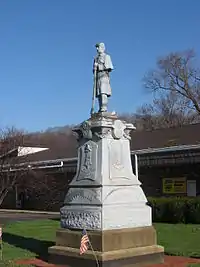Darlington, Pennsylvania | |
|---|---|
 Veterans Memorial in central Darlington | |
 Location in Beaver County and the U.S. state of Pennsylvania. | |
| Coordinates: 40°48′36″N 80°25′24″W / 40.81000°N 80.42333°W | |
| Country | United States |
| State | Pennsylvania |
| County | Beaver |
| Settled | 1804 |
| Incorporated | 1820 |
| Government | |
| • Type | Borough Council |
| Area | |
| • Total | 0.08 sq mi (0.21 km2) |
| • Land | 0.08 sq mi (0.21 km2) |
| • Water | 0.00 sq mi (0.00 km2) |
| Population | |
| • Total | 249 |
| • Density | 3,036.59/sq mi (1,173.83/km2) |
| Time zone | UTC-5 (Eastern (EST)) |
| • Summer (DST) | UTC-4 (EDT) |
| Zip code | 16115 |
| Area code | 724 |
| FIPS code | 42-18192 |
| Website | http://darlingtonborough.com/ |
Darlington is a borough in northwestern Beaver County, Pennsylvania, United States. The population was 249 at the 2020 census.[3] It is a part of the Pittsburgh metropolitan area.
History
Darlington was settled in 1804 and incorporated on March 28, 1820, as Greersburg. It adopted its current name on April 6, 1830. Darlington is named for S. P. Darlington, a merchant from Pittsburgh.[4]
Geography
Darlington is located at 40°48′36″N 80°25′24″W / 40.81000°N 80.42333°W (40.809917, −80.423381).[5] It is completely surrounded by Darlington Township.
According to the United States Census Bureau, the borough has a total area of 0.1 square miles (0.26 km2), all land.
Demographics
| Census | Pop. | Note | %± |
|---|---|---|---|
| 1860 | 301 | — | |
| 1870 | 280 | −7.0% | |
| 1880 | 247 | −11.8% | |
| 1890 | 254 | 2.8% | |
| 1900 | 270 | 6.3% | |
| 1910 | 311 | 15.2% | |
| 1920 | 347 | 11.6% | |
| 1930 | 465 | 34.0% | |
| 1940 | 444 | −4.5% | |
| 1950 | 354 | −20.3% | |
| 1960 | 306 | −13.6% | |
| 1970 | 344 | 12.4% | |
| 1980 | 377 | 9.6% | |
| 1990 | 311 | −17.5% | |
| 2000 | 299 | −3.9% | |
| 2010 | 254 | −15.1% | |
| 2020 | 249 | −2.0% | |
| 2021 (est.) | 244 | [3] | −2.0% |
| Sources:[6][7][8][9][2] | |||
As of the 2000 census,[7] there were 299 people, 122 households, and 79 families residing in the borough. The population density was 3,217.7 inhabitants per square mile (1,242.4/km2). There were 130 housing units at an average density of 1,399.0 per square mile (540.2/km2). The racial makeup of the borough was 97.99% White, 0.67% Asian, 0.67% from other races, and 0.67% from two or more races. Hispanic or Latino of any race were 0.67% of the population.
There were 122 households, out of which 28.7% had children under the age of 18 living with them, 51.6% were married couples living together, 11.5% had a female householder with no husband present, and 35.2% were non-families. 32.0% of all households were made up of individuals, and 16.4% had someone living alone who was 65 years of age or older. The average household size was 2.45 and the average family size was 3.14.
In the borough the population was spread out, with 23.4% under the age of 18, 11.0% from 18 to 24, 26.4% from 25 to 44, 21.1% from 45 to 64, and 18.1% who were 65 years of age or older. The median age was 38 years. For every 100 females, there were 83.4 males. For every 100 females age 18 and over, there were 73.5 males.
The median income for a household in the borough was $30,125, and the median income for a family was $38,750. Males had a median income of $25,625 versus $22,000 for females. The per capita income for the borough was $15,938. About 3.9% of families and 9.2% of the population were below the poverty line, including 10.9% of those under the age of eighteen and 9.7% of those sixty five or over.
Education
Children in Darlington are served by the Blackhawk School District. The current schools serving Darlington are:
- Patterson Primary School – grades K–2
- Blackhawk Intermediate School – grades 3–5
- Highland Middle School – grades 6–8
- Blackhawk High School – grades 9–12
See also
References
- ↑ "ArcGIS REST Services Directory". United States Census Bureau. Retrieved October 12, 2022.
- 1 2 "Census Population API". United States Census Bureau. Retrieved October 12, 2022.
- 1 2 Bureau, US Census. "City and Town Population Totals: 2020-2021". Census.gov. US Census Bureau. Retrieved July 19, 2022.
- ↑ Gannett, Henry (1905). The Origin of Certain Place Names in the United States. Govt. Print. Off. pp. 100.
- ↑ "US Gazetteer files: 2010, 2000, and 1990". United States Census Bureau. February 12, 2011. Retrieved April 23, 2011.
- ↑ "Census of Population and Housing". U.S. Census Bureau. Retrieved December 11, 2013.
- 1 2 "U.S. Census website". United States Census Bureau. Retrieved January 31, 2008.
- ↑ "Incorporated Places and Minor Civil Divisions Datasets: Subcounty Resident Population Estimates: April 1, 2010 to July 1, 2012". Population Estimates. U.S. Census Bureau. Archived from the original on June 11, 2013. Retrieved December 11, 2013.
- ↑ "Census of Population and Housing". Census.gov. Retrieved June 4, 2016.
